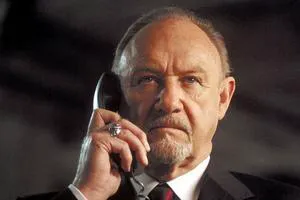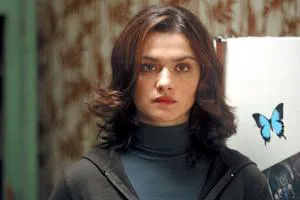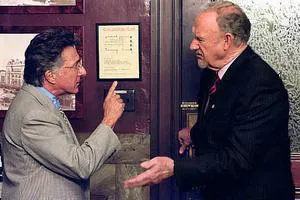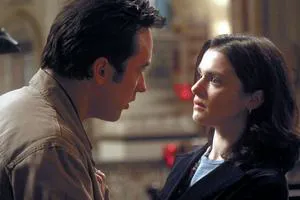“Runaway Jury”: A Verdict of Disappointment
In the realm of legal thrillers, “Runaway Jury” seemed to have all the right ingredients. A solid foundation in the form of a John Grisham bestseller. A reliable producer in Arnon Milchan, known for a string of hits and numerous Grisham adaptations. A competent director in Gary Fleder, possessing both a sense of humor and a good sense of pacing. And finally, a cast that initially appeared worthy of an Oscar. So, what went wrong? The film lacks substance. Perhaps assigning the screenplay to four writers was a misstep.

The Recipe for Disaster
Like a dish gone wrong in culinary school, “Runaway Jury” seemingly had everything it needed. A dependable source material in another John Grisham bestseller. A trustworthy producer in Arnon Milchan, who brought us hits like “Once Upon a Time in America,” “Brazil,” “Pretty Woman,” “JFK,” “L.A. Confidential,” “Fight Club,” and Grisham adaptations like “The Client” and “A Time to Kill.” A reliable director in Gary Fleder, who showed his humor in “Things to Do in Denver When You’re Dead” and his sense of rhythm in “Kiss the Girls.” And a cast that looked like it could win awards: in addition to the promising John Cusack and Rachel Weisz, “Runaway Jury” marked the first time Gene Hackman and Dustin Hoffman shared the screen. They’ve been friends for half a century, since they swept floors in the same store and shared a bunk in a dorm, but they had never worked together before. This should have guaranteed depth and impact, no matter the subject matter.
Missing Ingredients
What’s missing from the film? Well, meaning, of course. But, in reality, it lacks everything. The acting, the directing, the suspense, even the scale of the project, which is what usually draws people in. Why? Because the screenplay should not have been given to four writers whose only goal was to cash in. However, everyone else involved is also to blame. Why didn’t they see the problems earlier, with all their experience? Were they just trying to express themselves? And now, are the audience and critics supposed to express themselves more forcefully? Are we supposed to say it’s a delightful movie, the most delightful ever? What if people aren’t inclined to use strong language? It’s just boring.

A Tedious Start
The film starts with John Cusack repeatedly refusing jury duty, even though he received a summons. He works in a department store, in the toy section, drinks with friends, and someone is watching him. Who is watching is unclear, but it will be revealed later. A hint of intrigue. Then, John Cusack shows up at the courthouse for jury selection. He really wants to be dismissed, but he ends up on the jury for a case against a giant arms corporation. The case is brought by the widow of a man who was a victim of a shooting by a disgruntled former employee. The employee used a gun made by the corporation. The widow’s lawyer, played by Dustin Hoffman, believes that if the corporation hadn’t made the gun, the shooting wouldn’t have happened.
All of this is incredibly boring, especially when the questionable logic is explained for about an hour while potential jurors are dismissed one by one. Why the lawsuit wasn’t filed against the government, which allows the free sale of weapons, is never explained. But then, we finally see who was watching Cusack. It’s surveillance from the other side – the corporation’s lawyer, played by Gene Hackman, who has been hired to win the case at any cost. He has a big team, computers, special effects, and all the “modern” tools. But it’s clear that it will just be an “intellectual” clash between the good guy and the bad guy, and nothing more. There’s only a faint hope that if something clever is invented, this banality might still be watchable.

Predictable Twists and Turns
The film then revolves around the jurors. Hackman wants to buy them, Hoffman wants to stop him, and some mysterious forces have sent messages to both sides saying that the jury can be bought for a large sum. It soon becomes clear that the mysterious forces are Rachel Weisz and someone else, and that if the money is delivered to the right place at the right time, the verdict will be yours. Not much of a revelation. The next hour is filled with blackmail, confrontations, and a final battle of wills, until the good guys win. The boredom grows with each minute, not just because of the predictable ending, but because the film took the wrong path. Instead of going deeper, everything is spread out and piled on, so nothing is important, and the “nuances” and “subtleties” are purely bureaucratic.
The jury system, which is not an absolute truth in itself, is further bogged down in the convoluted American legal system. The only human element is that one of the jurors is fired for drinking on the job. But the question arises: who guaranteed that she would be unfair if she had been drinking? Has this been proven, or is it just another American obsession with a healthy lifestyle being forced on us as truth? Maybe smokers aren’t allowed on juries in America either? There’s also the scene of the main conversation between Hoffman and Hackman in the courthouse bathroom, but even that is strangely detached. You just sit and laugh as the cinematographer (Robert Elswit) spends ten minutes trying to hide the fact that Hackman is two heads taller than Hoffman. There’s low-angle shots, cropped frames, and perspective tricks, with Hoffman closer to the camera, making Hackman seem shorter. It’s funny, while they’re boringly telling each other, “You’re a jerk,” “You’re an idiot,” “No, you’re a jerk,” “No, you’re an idiot.”

A Hollow Verdict
By the end, any interest in the trial and the verdict has vanished. Everything is questionable, and John Cusack is also forced. There’s a strong feeling that things aren’t really like that in America, but rather the opposite – with the jurors, the lawyers, the weapons, the blackmail, the corruption, the verdicts, and everything else.
The only thing that isn’t lacking is money, a lot of money, wasted on such nonsense.